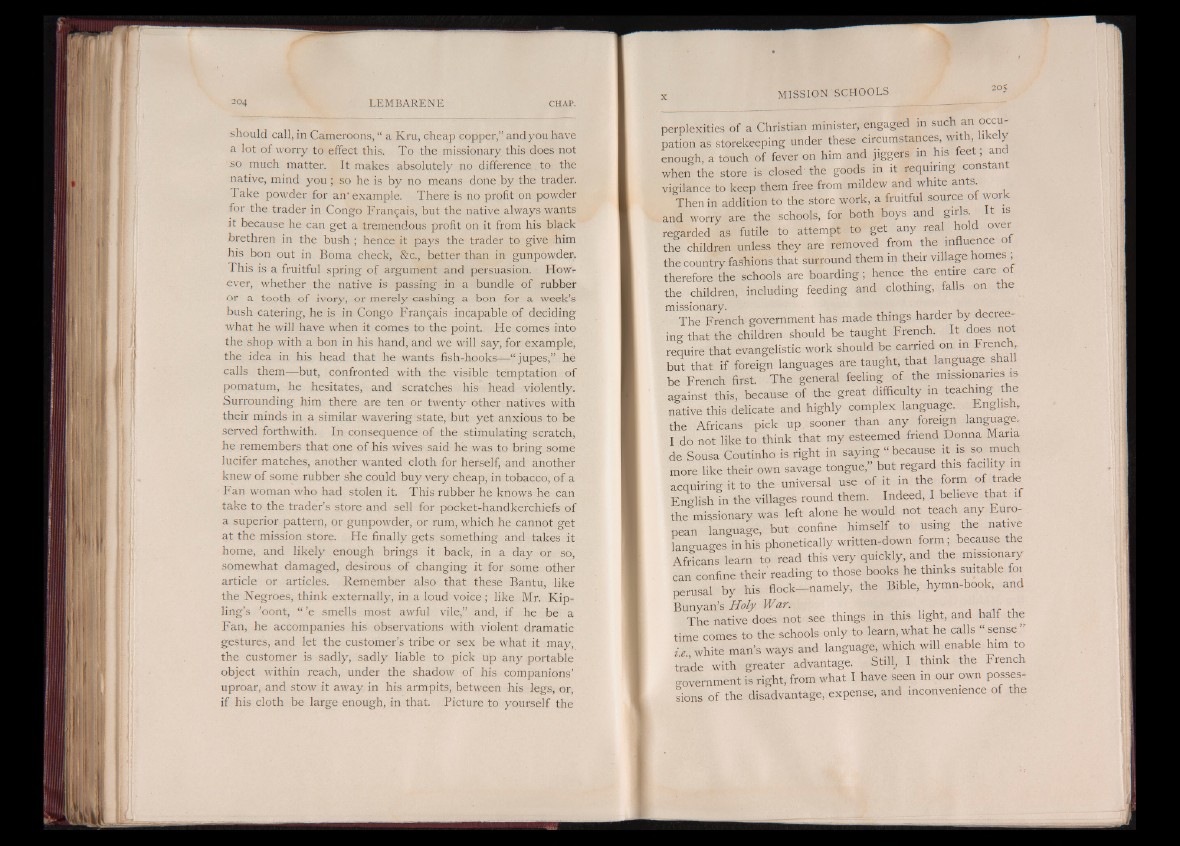
should call, in Cameroons, “ a Kru, cheap copper,” and you have
a lot of worry to effect this. To the missionary this does not
so much matter. It makes absolutely no difference to the
native, mind you ; so he is by no means done by the trader.
Take powder for an'example. There is no profit on powder
for the trader in Congo Français, but the native always wants
it because he can get a tremendous profit on it from his black
brethren in the bush ; hence it pays the trader to give him
his bon out in Boma check, &c., better than in gunpowder.
This is a fruitful spring of argument and persuasion. HoWr
ever, whether the native is passing in a bundle of rubber
or a tooth of ivory, or merely cashing a bon for a week’s
bush Catering, he is in Congo Français incapable of deciding
what he will have when it comes to the point. He comes into
the shop with a bon in his hand, and we will say, for example,
the idea in his head that he wants fish-hooks— “ jupes,” he
calls them— but, confronted with the visible temptation of
pomatum, he hesitates, and scratches his head violently.
Surrounding him there are ten or twenty other natives with
their minds in a similar wavering state, but yet anxious to be
served forthwith. In consequence of the stimulating scratch,
he remembers that one of his wives said he was to bring some
lucifer matches, another wanted cloth for herself, and another
knew of some rubber she could buy very cheap, in tobacco, of a
Fan woman who had stolen it. This rubber he knows he can
take to the trader’s store and sell for pocket-handkerchiefs of
a superior pattern, or gunpowder, or rum, which he cannot get
at the mission store. He finally gets something and takes it
home, and likely enough brings it back, in a day or so,
somewhat damaged, desirous of changing it for some other
article or articles. Remember also that these Bantu, like
the Negroes, think externally, in a loud voice ; like Mr. Kipling’s
’oont, “ ’e smells most awful vile,” and, if he be a
Fan, he accompanies his observations with violent dramatic
gestures, and let the customer’s tribe or sex be what it may,
the customer is sadly, sadly liable to pick up any portable
object within reach, under the shadow of his companions’
uproar, and stow it away in his armpits, between his legs, or,
if his cloth be large enough, in that. Picture to yourself the
perplexities of a Christian minister, engaged in such an occupation
as storekeeping under these circumstances, with, U e y
enough, a touch of fever on him and jiggers in his fe e t; and
when the store is closed'the goods in it requiring constant
vigilance to keep them free from mildew and white ants
Then in addition to the store work, a fruitful source of work
and worry are the schools, for both boys and girls. It is
regarded as futile to attempt to get any real hold over
the children unless they are removed from the influence of
the country fashions that surround them in their village homes
therefore the schools are boarding; hence the entire care o
the children, including feeding and clothing, falls on the
missionary. , ,
The French government has made things harder by decreeing
that the children should be taught French. It does not
require that evangelistic work should be carried on m French
but that if foreign languages are taught, that language sha
be French first. The general feeling of the missionaries is
against this, because of the great difficulty in teaching the
native this delicate and highly complex language. English,
the Africans pick up sooner than any foreign language.
I do not like to think that my esteemed friend Donna Maria
de Sousa Coutinho is right in saying “ because it is so much
more like their own savage tongue,” but regard this facility m
acquiring it to the universal use of it in the form of trade
English in the villages round them. Indeed, I believe that if
the missionary was left alone he would not teach any European
language, but confine himself to using the native
languages in his phonetically written-down form; because the
Africans learn to read this very quickly, and the missionary
can confine their reading to those books he thinks suitable foi
perusal by his flock— namely, the Bible, hymn-book, and
Bunyan’s Holy War. ,
The native does not see things in this light, and half the
time comes to the schools only to learn,what he calls “ sense”
ie white man’s ways and language, which will enable him to
trade with greater advantage. Still, I think the French
cxovernment is right, from what I have seen in our own possessions
of the disadvantage, expense, and inconvenience of the